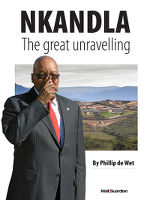Jacob Zuma's Nkandla homestead.
NEWS ANALYSIS
Twenty-eight court days – and counting. That’s how long Public Works Minister Thulas Nxesi has to deliver full disclosure on how ministers and top officials went about spending nearly R250-million on President Jacob Zuma’s private residence.
On Tuesday, Judge Vuyelwa Tlhapi ordered Nxesi and the department to disclose crucial Nkandla documents thus far kept hidden from public view.
The judgment flows from a Promotion of Access to Information Act application launched by amaBhungane in July 2012.
At that stage, public works issued a blanket refusal, claiming that the whole project was so sensitive, nothing at all could be disclosed.
In June 2013, on the proverbial steps of the courthouse, the department capitulated and offered to release about 12 000 pages in 42 files.
Decisive core
That disclosure formed the core of amaBhungane’s award-winning reporting on Nkandla, and also proved decisive when the security cluster sought to veto the release of public protector Thuli Madonsela’s draft report.
Madonsela was able to point to the 12 000 pages already in the public domain, which disposed of the state’s claims to a secrecy prerogative.
However, what was clear from the documents was that they were drawn exclusively from the files of the Durban regional office.
There appeared to be no material included from head office in Pretoria, save for copies of things that might have been shared with the Durban office.
Especially tantalising were references to regular meetings between President Zuma and his architect, as well as numerous Zuma meetings with ministers or deputy ministers, all of which one might expect to be minuted or recorded in some way.
Level of involvement
It is these documents that might reveal just how much the president was consulted or gave instructions about the extent and cost of the so-called “security upgrade”.
This void formed the crux of amaBhungane’s high court application in November last year, arguing that Nxesi had not made full disclosure.
Lawyers for public works were forced to concede that there was no disclosure from head office and that no search was ever conducted in Pretoria for any relevant documents.
The department tried to argue that there had been “sufficient” disclosure. Despite not looking, it also tried to suggest that such documents did not exist.
Judge Tlhapi would have none of that. In an important passage of her judgment, she noted: “The possibility of … no records being kept pertaining to ‘top management’ decisions, especially those records like in this matter that have … financial implications … is a serious indictment …”
Record-keeping
The judge said keeping proper records was “one of the most important obligations of a government”.
She decried as a “dereliction” any suggestion of a “failure to keep records or a tendency to lose documents, or to hide them or deal with government business under a cloud of secrecy where it is not justified”.
Judge Tlhapi gave the department 30 court days to make further disclosure, including documents filed by the Pretoria head office, and ordered director general Mziwonke Dlabantu to produce an affidavit accounting for all the documents the department claimed could not be traced or did not exist.
Past conduct, however, suggests the dilly-dallying may not be over.

It is the story that would define a presidency. Phillip de Wet pulls together four years of reporting about Nkandla into a compelling e-book, now available for $1.50 until May 18 from Amazon.com and authorised Paperight outlets.
* Got a tip-off for us about this story? Click here.

The M&G Centre for Investigative Journalism (amaBhungane) produced this story. All views are ours. See www.amabhungane.co.za for our stories, activities and funding sources.